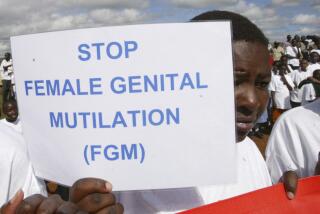Circumcision wars: The other side weighs in
- Share via
Maybe up there with abortion and healthcare reform, circumcision of male babies and children is shaping up to be one of the hottest issues in the sociomedical world over the next few years. Once uniformly regarded as kooks by nearly everyone, people who vow to outlaw circumcision are now only regarded as kooks by the majority of people. They managed to get a measure on the San Francisco ballot last year. The California Legislature quickly intervened, passing a law that made it (rightly) clear that the state is in charge of determining medical law, not individual cities, which ended that as well as any talk of measures elsewhere in the state.
In June, a German court ruled that circumcision was illegal. Hospitals have stopped the practice though Chancellor Angela Merkel has vowed that the circumcision will not be outlawed in her country. She just hasn’t articulated how she’ll do that. Jews and Muslims, whose religions include ritual circumcision, are protesting and pointing out that piercing babies’ ears is legal in Germany.
(They may have spoken a little too soon. Now, the courts are reportedly looking into whether to ban the piercings, too.)
At the same time, Denmark is reportedly looking into whether male circumcision violates the country’s health laws.
It would be much tougher to institute a total ban in this country, where there is strong constitutional protection of freedom of religion. But those protections extend only to members of the affected religions. And even religious freedom is not an absolute; courts have ruled in the past, in cases where parents refused treatment that would save their children’s lives, to require the medical care. But overriding religious beliefs would require a clear finding that circumcision is bad for children. And what about parents whose religious beliefs do not call for circumcision but whose personal beliefs do?
Enter medical reality. Circumcision, far from being unhealthful, is good for boys and men, and for the nation’s wallet, according to the experts. Last week, a study out of Johns Hopkins University predicted that healthcare costs in the United States would rise by billions of dollars in coming decades as the popularity of circumcision wanes, largely because of increases in the rates of sexually transmitted diseases and related cancers; studies in Africa and elsewhere found that circumcision lowered the risk of HIV infection. This week, the American Academy of Pediatrics shifted from a neutral position on circumcision to one saying that the health benefits of circumcision outweigh the risks. The physicians’ group stopped short of recommending that all baby boys be circumcised, but its position will likely persuade more health insurers to cover the procedure; coverage has been falling off in recent years because of the academy’s previous stance.
That surely won’t end the fight, though, which revolves as much around the idea of whether it’s all right for parents to make a permanent change in a child’s body before he is old enough to choose, as it does around medical issues.
ALSO:
GOP angling for Catholic votes
Prop. 32: What really scares California’s big unions
Affirmative action in college admissions is not required
More to Read
A cure for the common opinion
Get thought-provoking perspectives with our weekly newsletter.
You may occasionally receive promotional content from the Los Angeles Times.










